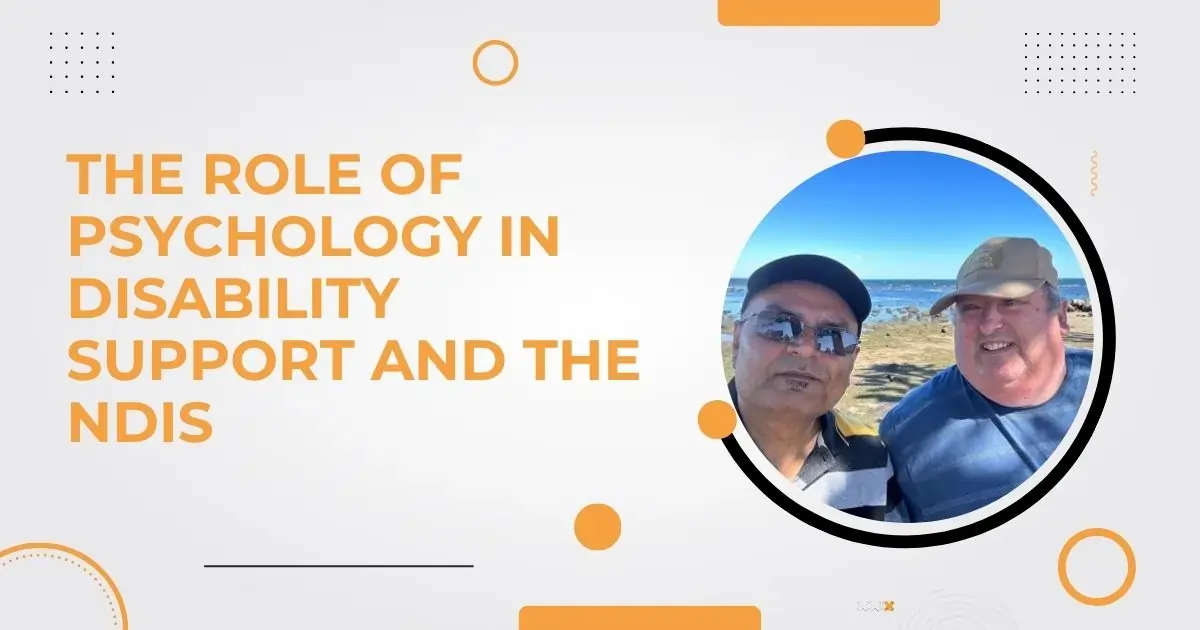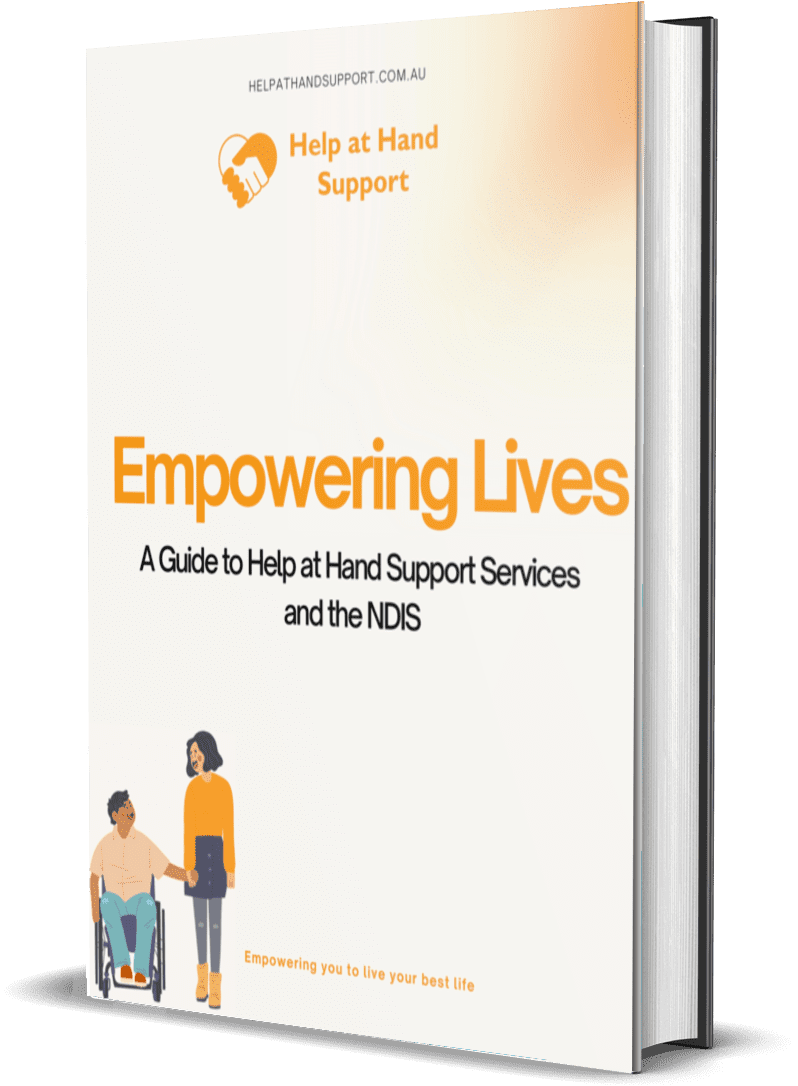What is the Link Between Disability and Mental Health?
People with disability often face mental health challenges due to social exclusion, communication barriers, and life transitions.
Disability can impact how a person interacts with the world, affecting their confidence, identity, and emotional regulation.
Many individuals experience:
- Increased risk of depression, anxiety, or PTSD
- Isolation due to communication or sensory barriers
- Low self-esteem linked to stigma or misdiagnosis
- Emotional overload in navigating everyday environments
Psychological support helps individuals understand these feelings and respond with strength and self-awareness.

How does Psychology Support People with Disability?
Psychology helps people with disability manage emotions, understand behaviour, develop social skills, and heal from trauma improving their quality of life through evidence-based, person-centred care.
The following areas show how psychological support delivers measurable benefits across individual, family, and community outcomes.
Improved Emotional Wellbeing
Psychologists guide individuals in identifying emotions, developing healthy coping tools, and managing conditions like anxiety, depression, and stress.
This support is especially important during life transitions, medical diagnoses, or social challenges.
Support for Neurodivergent Individuals
Psychology offers neuro-affirming strategies for people with autism, ADHD, learning difficulties, or intellectual disability to build communication, self-awareness, and emotional regulation.
Therapists tailor interventions to the person’s goals and strengths not just their diagnosis.
Behaviour Support and Regulation
Psychologists identify the purpose behind challenging behaviours and use positive, respectful techniques to promote emotional control, independence, and social connection.
These approaches align with NDIS behaviour support requirements and individual behaviour plans.
Family and Carer Support
Psychology provides education, emotional support, and problem-solving tools to help families understand their loved one’s needs and respond with empathy and structure.
Sessions may include joint planning, stress-reduction techniques, and the development of communication skills.
Trauma-Informed Care
Psychologists trained in trauma-informed practice offer a safe, respectful space for individuals who have experienced abuse, neglect, or systemic harm to heal at their own pace.
This care is especially vital for people affected by institutionalisation or long-term trauma.
How does Psychology Fit into the NDIS?
Psychology is a funded therapeutic support under the NDIS that covers assessments, counselling, behaviour support, and early intervention when included in a participant’s plan.
Participants may receive NDIS funding for:
- Psychological assessments for diagnosis clarification, functional capacity evaluations, and goal setting
- Behavioural therapy to manage emotional regulation, reduce harmful behaviours, and build social skills
- Ongoing mental health sessions to support anxiety, depression, trauma, or adjustment to disability
Funding is available under categories like Improved Daily Living or Capacity Building Therapeutic Supports, depending on individual goals and needs.
Why is Psychology Essential for Disability Well-being?
Mental health care supports growth, self-confidence, and better life outcomes for people with disability.
With the right psychologist and the right support, individuals can:
- Improve emotional resilience and self-worth
- Strengthen friendships and family connections
- Develop independence in daily life
- Achieve goals with less stress and more clarity
Psychology is not just support; it is a pathway to empowerment.
Who is Boutique Psychology, and how do they help?
Boutique Psychology is a Melbourne-based clinic offering inclusive, evidence-based therapy tailored to children, teens, and adults with disability.
Founded by Cindy, Boutique Psychology specialises in neurodivergence, trauma recovery, and emotional resilience.
Boutique Psychology offers the following services.
- Autism and ADHD-focused support
- Client-first therapy grounded in empathy and science
- NDIS-informed strategies aligned with individual goals
Whether for behaviour support, assessments, or treatment, their team creates a safe space for clients and families to feel heard and grow.
Practices like Boutique Psychology are NDIS-experienced and ready to help participants navigate plan goals with compassion and care.
Where can I access disability-informed psychology services in Melbourne?
Boutique Psychology provides NDIS-aligned services for children, teens, and adults with neurodivergence, trauma, or emotional needs.
They are committed to safe, inclusive care that honours each person’s story.
Visit www.boutiquepsychology.au for more details.
Frequently Asked Questions
What does a psychologist do for someone with a disability?
A psychologist supports emotional regulation, builds coping strategies, and provides tools for behaviour management, social skills, and trauma recovery.
Can I use my NDIS funding for psychology?
Yes, if psychology is part of your plan under Therapeutic Supports or Early Intervention. You may be eligible for funding for assessments, therapy, or behaviour support.
Is psychology suitable for children with autism or ADHD?
Absolutely. Psychology helps children build emotional awareness, communication skills, and positive behaviour patterns, especially with a neurodiversity-affirming approach.
What is trauma-informed psychology?
It is a respectful, safe method of therapy that recognises the emotional impact of past trauma and works at a pace led by the individual.
Do psychologists also help carers or family members?
Yes. Many therapists offer family sessions or carer support to help loved ones understand behaviours, reduce stress, and build stronger relationships.
What does Allied Health mean under the NDIS?
At Help at Hand Support, our Allied Health services include psychology, occupational therapy, speech therapy, physiotherapy, and functional assessments.
These supports help participants improve communication, mobility, behaviour, and emotional wellbeing.
Each service is aligned with NDIS plan goals to build capacity, independence, and quality of life through a multidisciplinary approach.
Check out more from our Blog
Book A Care Consult
We will be in contact with you shortly







